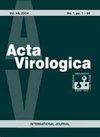细胞培养中小檗碱对寨卡病毒和登革热病毒的抑制作用
IF 0.8
4区 医学
Q4 VIROLOGY
引用次数: 0
摘要
小檗碱(Berberine, BBR)是一种植物衍生的异喹啉生物碱,具有多种生物活性。本研究表明,BBR在Vero细胞中对寨卡病毒(ZIKV)的不同毒株和登革热病毒(DENV)的四种血清型具有较强的抗病毒活性,具有广谱抑制作用。在人细胞系中也证实了BBR对ZIKV和DENV-2生长的抑制作用。BBR作用模式分析表明,该化合物不影响病毒增殖周期的早期事件或病毒蛋白的表达。相比之下,BBR强烈地破坏了细胞内和细胞外感染性病毒颗粒的形成。此外,BBR能够抑制ZIKV诱导的ERK1/2和p38细胞信号通路的激活,并在未感染的细胞中降低p38磷酸化。与BBR一样,p38抑制剂SB202190在未感染和寨卡病毒感染的培养物中都降低了p38磷酸化,即使在感染后期添加,也会显著降低病毒产量。这些结果首次表明,BBR对p38信号的抑制作用可能有助于该化合物对黄病毒的抗病毒作用。本文章由计算机程序翻译,如有差异,请以英文原文为准。
Berberine inhibitory action against zika and dengue viruses in cell cultures
Berberine (BBR) is a plant derived isoquinoline alkaloid that displays a great variety of biological activities. In this study we showed that BBR exhibits a strong antiviral activity with broad spectrum of inhibition against different strains of Zika virus (ZIKV) and the four serotypes of dengue virus (DENV) in Vero cells. The inhibitory effect of BBR on ZIKV and DENV-2 growth was also demonstrated in human cell lines. The analysis of BBR mode of action showed that the compound did not affect early events of viral multiplication cycle or viral protein expression. By contrast, BBR strongly impaired the formation of intracellular and extracellular infectious viral particles. Furthermore, BBR was able to inhibit ZIKV induced activation of ERK1/2 and p38 cell signaling pathways and also reduced p38 phosphorylation in uninfected cells. Like BBR, the p38 inhibitor SB202190 reduced p38 phosphorylation in both uninfected and ZIKV infected cultures and caused a significant diminishment of viral yields even when it was added late during the infection. These results suggest for the first time that the inhibitory effect of BBR on p38 signaling might contribute to the antiviral action of the compound against flaviviruses.
求助全文
通过发布文献求助,成功后即可免费获取论文全文。
去求助
来源期刊

Acta virologica
医学-病毒学
CiteScore
3.10
自引率
11.80%
发文量
43
审稿时长
>12 weeks
期刊介绍:
Acta virologica is an international journal of predominantly molecular and cellular virology. Acta virologica aims to publish papers reporting original results of fundamental and applied research mainly on human, animal and plant viruses at cellular and molecular level. As a matter of tradition, also rickettsiae are included. Areas of interest are virus structure and morphology, molecular biology of virus-cell interactions, molecular genetics of viruses, pathogenesis of viral diseases, viral immunology, vaccines, antiviral drugs and viral diagnostics.
 求助内容:
求助内容: 应助结果提醒方式:
应助结果提醒方式:


